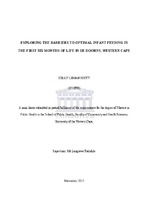| dc.contributor.advisor | Tsolekile, Lungiswa | |
| dc.contributor.author | Scott, Kelly Leman | |
| dc.date.accessioned | 2018-04-18T10:24:45Z | |
| dc.date.available | 2018-04-30T22:10:07Z | |
| dc.date.issued | 2017 | |
| dc.identifier.uri | http://hdl.handle.net/11394/5982 | |
| dc.description | Magister Public Health - MPH (Public Health) | |
| dc.description.abstract | Adequate infant feeding (IF) practices, specifically exclusive breastfeeding (EBF) for the first
six months of life, is one of the approaches to addressing malnutrition. The World Health
Assembly has set an international target to increase the rate of EBF to 50% by 2025. In a
study on the IF practices in the Breede Valley sub-district, within the Cape Winelands health
district, the EBF rate was 6%. Despite a recently documented improvement in the South
African EBF rate, further improvements need to be made to reduce our stagnant rates of
stunting, undernutrition and increasing rates of overnutrition. This study aimed to explore the
mothers' perceptions regarding the factors that contribute to poor IF practices in the first six
months of life in the De Doorns area, Western Cape. | |
| dc.language.iso | en | |
| dc.publisher | University of the Western Cape | |
| dc.title | Exploring the barriers to optimal infant feeding in the first six months of life in De Doorns, Western Cape | |
| dc.rights.holder | University of the Western Cape | |

